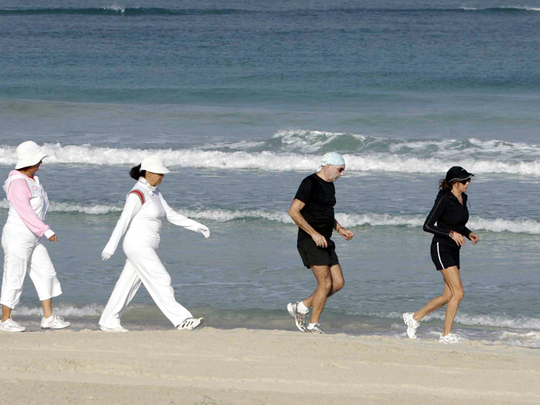
Dubai: As health officials celebrate World Stroke Day on Thursday, new statistics are painting a worrisome picture in the UAE regarding a higher prevalence rate of the condition.
And it is striking people in the UAE at much lower ages, health officials said on Wednesday.
While stroke is seen as a condition that strikes the elderly in the age group of 65-85 in Canada, North America and other western Countries where 80 per cent of the patients fall in this category, nearly 50 per cent of stroke patients in the UAE are below the age of 45.
Dr Sohail Al Rukn, stroke and neurology consultant and head of the stroke unit at Rashid Hospital, revealed this alarming statistic on the eve of World Stroke Day.
The Dubai Health Authority (DHA), in collaboration with Boehringer Ingleheim, launched a stroke awareness campaign on Wednesday to mark the day. The campaign was launched by Dr Ahmad Bin Kalban, CEO of Hospital Services Sector at the DHA, and Dr Alya Saif Al Mazroui, CEO of Rashid Hospital, in the presence of senior health officials, including Dr Al Rukn.
“While there are many contraindications for stroke, women who use oral contraceptive pills run a slightly higher risk as the ingestion of these pills impacts the viscosity of blood, making it more thick and prone to clotting. Therefore, women who take oral contraceptive pills must take care to cut out smoking completely. Smoking by itself raises the risk of stroke three to four times and, combined with oral contraceptive pills, increases the risk of incidence five times,” he added.
Dr Al Rukn also pointed out that stroke is the third leading cause of death in the world and the main reason for adult disability. In the UAE, after road accidents, it is the second leading cause of disability. Annually 7,000-8,000 patients in the UAE get a stroke; this means every hour, one person gets a stroke.
Rashid Hospital is the only dedicated 24/7 stroke unit in the emirate and since its inception in early 2012, more than 600 patients have been admitted to the hospital, with nearly 150 in need of acute stroke management.
People in the emirate need to stop leading sedentary lifestyles, cut out stress and pay attention to better nutrition if they intend to eliminate the risk of stroke.
Dr Al Rukn pointed out that while the human body requires just two to three grams of salt a day, people in the UAE were ingesting as much as 12-15 grams of salt each day in processed and fast foods high in preservatives.
“People need to follow a healthy lifestyle, work out, cut out fatty foods and hydrate themselves as dehydration makes the blood thicker, inducing clots,” he added.
The campaign included free health screening which included several tests which help calculate the likelihood of a person developing a stroke in the next ten years.












